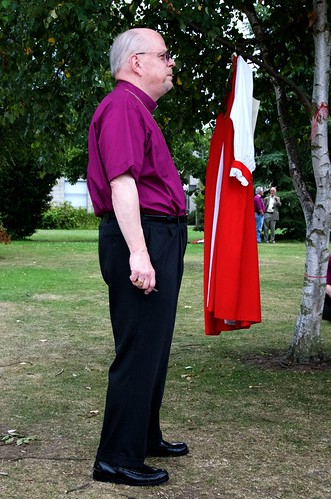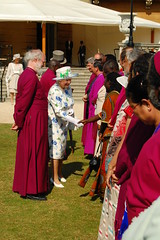
Let's get one thing straight (
pun intended): it's
not about homosexuality.
Homosexuality is a "flashpoint" issue -- one which arose because of changes in first world culture coming into conflict with Christian tradition... and because proponents of that lifestyle targeted the Episcopal church as a vulnerable target to exploit -- to gain social and cultural "legitimacy" for their sexual behavior.(*)
But any other anti- traditional Christianity issue could have had the same effect. (Indeed, it has: back in the mid to late 70s, the ordination of women -- also a culturally-fueled abandonment of traditional Christian belief and practice -- had very much the same effect, though not on a live-blogged international stage.)
It's
not about sex -- it's about the fundamentals of faith. And
not because sexual morality is, in and of itself, such a fundamental (not like, say, Christological issues) but because it serves as an index to a more primary, fundamental issue: i.e.,
what defines the faith? Is it Scripture and Tradition... or is it personal feelings and contemporary culture? The way Anglicans have dealt with the homosexuality issue is simply one instance of that more essential question being answered in a specific case.
As bishop Anis, primate of the Middle East,
puts it:
I see that a big wall still divides us. It is big because it involves the essentials, the foundation of our faith. We are not divided by mere trivialities, or issues on the periphery of faith. We are finding it very hard to come together in the essentials. This diversity of opinion is about the heart of our faith, the faith which we received from the saints.
Those who embrace the homosexualist heresy have done so by abandoning the essentials -- have done so because, for them, those essentials are no longer essential. Accepting homosexuality is simply one ramification of this abandonment. And it's not just me saying so -- that's what the
majority of Anglican bishops think and how they view the current division:
Every bishop I have spoken with, who is not from the USA, says that departure from the norm, or new development of the faith is not the issue here. The issue is the Scriptural teaching that Christians do no indulge in the culture, but live apart from it. Homosexual orientation or proclivity does not require indulgence. We are called to chastity, higher standards in moral and ethical teachings and encouraged to live holy lives. This applies equally to men and women of any persuasion. The Biblical and Christian norm is for sex to be confined within the boundary of the marriage of a man and a woman – there perfect freedom is found.
Scripture and Tradition explicitly reject homosexual activity. (They also, by the way, reject pre-marital sex, polygamy, remarriage after divorce, and adultery. It's not just "gay people" who have their predilections curtailed by Christian morality!) Go take it up with
Dr. Gagnon if you want to
kick against the pricks of those historical and theological facts (
pun, unfortunately, again intended). My purpose here is to explain the conflict, not to defend one side or the other.
So here's the key question, the one which underlies the crisis in the Anglican communion (be it the divisions over homosexuality, or the ordination of women, or the toleration of divorce, or whatever): is Christianity (including Anglicanism) a faith which can constantly re-interpret and re-present itself with an infinitely malleable dogma (sort of like Mormonism) -- changing its teaching on sexual morality, or Christology, or whatever other issue happens to come up -- or is it a faith which has a central deposit, statements of eternal truth and its application, to which Christians are beholden?
If Scripture clearly says something, if Tradition clearly upholds that understanding, but if contemporary culture says something different, are Christians to obey Scripture and Tradition and themselves be transformed... or do they get to jettison or rewrite Scripture and Tradition to make them conform to this world? Do Christians follow and obey Jesus and that which He endorses... or do they take what they themselves "naturally" endorse, paste a "Jesus" sticker on it, and announce that they are, thereby, Christian? Is the Christian faith, as
bishop Ackerman puts it, a "gift" entrusted to believers for them to defend, protect, and pass on... or is it just a gimmick? Or, as
primate Anis asks, "Should we allow culture to pressure the Church or should the Church be distinctive, light and salt to the world?"
Whatever you think of the issues, whichever side you fall on, nevertheless
THIS QUESTION -- not homosexuality -- is what is dividing the Anglican Communion: the question of Christian authority and identity. This is why
bishop Beckwith said that the two sides are so far from being on the same page, that they're not only not in the same book, but they're in entirely different libraries. This is why
archbishop Anis complains of the divide between traditional Christians and the first-world liberals and apostates, because the latter
find it very difficult to say that Jesus Christ is the way, the truth and the life. They do not say this difficult issue should be driven by Scripture, not the culture. They say our morals should by shaped by the culture. If we allow this, we loose our distinctiveness as a church. Jesus called us to be light to the culture and salt to society.

The homosexuality issue is merely the tip of the iceberg... what is sinking the Anglican Communion is not the homosexualist tip, but the massive theological differences which ride under it.
That being the case, you would expect Lambeth -- trying to solve the current crisis -- would engage the
real issue in its indaba-dabba-doo sessions about sexuality. Expect it to ask whether or not there are any unchanging theological and moral absolutes in Christianity and, if so, whether or not sexual morality is part of those absolutes. Because, after all, that's the essential question and the heart of the crisis.
Then again, if you've been paying any attention to this decade's Lambeth, you probably aren't expect anything so sane, clear, or common-sensical after all. If you
were expecting something sensible... well, you'll be disappointed.
So what did the indabas on sexuality accomplish? Not much.
Certainly, the polarization hasn't vanished. In
the press-conference about the discussions, archbishop Aspinall said "I'm not aware of any bishops who have changed their minds." No, the most that can be said is that "I am aware of bishops who have thanked bishops who take a different view for helping them understand the issues better helping them understand what's at sake better." So what
did all the talking accomplish? "Some people have nuanced their positions."
Nuanced. Wow.
Nothing here like resolution 1.10 from Lambeth 1998 -- perhaps the most ignored and impotent statement ever to come out of a Lambeth Conference. (
Doubtless there's be even more greatly ignored statements this year... but, oh yeah, no resolutions are being made this year. How convenient). ++Williams continues to say that 1.10 represents the "majority" position in the Communion, but since "the process used last time didn't help the church move forward", 1.10 isn't being revisited.
Newsflash -- the problem wasn't with 1.10 or the process by which it was obtained, it was the total and abject failure to
do anything about it
afterwards that was the problem.
No; this time 'round, instead of saying that the Anglican Communion had a position to which its member jurisdictions were accountable, or even saying that the Communion has no position or accepts all position, lip-service was given to the pretense that there was still an "official" position, but all that actually happened was that bishops talked to each other about their own experiences.
And what has this accomplished? -- the "commitment we continue to make is that we are continuing to engage in indaba... we are now 'in indaba'... we are really truly talking to one another."
In indaba, eh? Is that anything like being in denial?
Aspinall contrasted the 1998 Lambeth, in which bishops hissed and booed each other, to what he saw in his indaba group this time 'round; when, after all their talking (no doubt the usual 2.5 minutes per bishop over the course of 2 hours) there was the
same degree of difference in the views held by the bishops -- but at the end of the indaba group, bishops from different ends of the spectrum on the issues actually embraced each other and thanked each other for helping them understand better what was at stake in these issues."
I'm sure its wonderful that the bishops are forming friendships and nuancing their positions and hearing about others' experiences and being in deep indaba and hugging. Peachy keen. I feel all warm and fuzzy now. (Though, frankly, they could have accomplish the same thing with a few good bottles of scotch and skipped the whole expensive Lambeth thing.)
But how does hugging bishops help the Anglican Communion?
Seems to me what you've got there is people on the Titanic comparing notes about their personal iceberg experiences... and those who are chatting on the deck, "nuancing" their iceberg position, are going down with the ship just as surely as their fellow interlocutors who are denying that there is an iceberg, or arguing that it's really just a bunch of icecubes and offers no threat to the vessel's seaworthiness. I'm sure those nuanced views about icecubes will be of great comfort to them as they're sucked down into the frozen, black, abysmal depths.
And yet, when pressed on what these indabas accomplished, the existence of these conversations and relationships was still the only accomplishment of the day which Aspinall could cite.
Q: We're hearing a lot about process... it's all very nice about how well you're getting along in indaba, but it looks like navel gazing... are you actually going to say anything to the outside world about human sexuality?
A: Significant steps are being taken in relationships between the bishops, and growth in understanding is occurring... we might not have reached consensus, in fact we certainly haven't reached consensus, but I believe people are feeling that significant growth is occurring.

Nothing about the fundamental issue has been addressed -- not on the question of sexuality, not on the underlying and critical divisions, not on the normative authority of Scripture and Tradition -- but merely that "significant growth" in the "relationships between the bishops" is occurring.
Rescuing the Anglican Communion -- one hugging bishop at a time. Puh-lease. Give me a break.
The problem is not whether or not the bishops like each other. The problem is that they have incompatible views on the meaning of Christianity itself -- not just the disagreements over sexuality, but over a whole host of issues which arise from fundamental disagreements over the authority of Scripture and Tradition: i.e. over the very definition of the faith!
And, I'm sorry, but on that score,
hugs just don't cut it.
But, since Lambeth refuses to deal squarely with the real issues, the complete incompatibility of world-views remains. Liberal +Johnson of Toronto said of the sexuality discussion: "it unreasonable to expect a full resolution to an issue that's a continuing conversation within the life of our whole world."
Um, bishop, even a first year catechist knows that
Christianity teaches: "And be not conformed to this world: but be ye transformed" -- we are not to wait to see what the "continuing conversation" in the secular world decides and then announce that that's what Christianity really means... we are to accept and preserve Christianity's basic theological and ethical statements (
e.g.: "among you there must not be even a hint of sexual immorality, or of any kind of impurity, or of greed, because these are improper for God's holy people") even if the world teaches differently. And if the world doesn't like it? Well:
If the world hate you, ye know that it hated me before it hated you. If ye were of the world, the world would love his own: but because ye are not of the world, but I have chosen you out of the world, therefore the world hateth you. John 15
If you can't even grasp or teach the difference between the Church and the world -- or, worse yet, if you have thrown your lot in with the world, accepting its teachings and rejecting Christ's -- then you not only shouldn't be a bishop, you shouldn't even be confirmed!
But alas... no such clarity or relevant discussions from
this Lambeth! No, we just get interminable conversations and embraces. Which is why the liberal Episcopal
press can happily conclude:
Left wing inclusion mongers should feel pretty good about this afternoon’s press conference on human sexuality at the Lambeth Conference. The bishops are sharing their views respectfully, speaking from their hearts, disagreeing vigorously, but forging real relationships despite their differences.
And why an increasingly liberal and apostate Episcopal clergy -- who see no place for themselves in a Communion which could issue a resolution 1.10 -- feel as if perhaps (provided they don't have to give up their homosexualist or other heresies) there's still some purpose for the Communion; as one Yale Div School
brainwashed indoctrinated corrupted trained priest said in response: "perhaps there's still some miles left in this old Communion of ours."
Give that man a hug.
So what positive or constructive signs
did Thursday, the day set aside to deal with the most divisive and fraught issue, give us? Johnson again:
Where consensus has critically gathered is in terms of around the environment, ecology, and the MDGs... the critical additional issues in our world which are MDGs.
Oooo... consensus on environmentalism! Not on the Gospel of Jesus Christ; not on the authority of Scripture; not on the nature of the Church; not on the transcendent and eternal glory of God and His Word; not on the Good News of the resurrection; not on the pattern of life, love and relationships which He has expressly given us.
Nope, it's all about the MDGs.
So if you expected this Lambeth to address the crisis, or say something definite about human sexuality, or articulate some Anglican or Christian norms or, quite frankly, do
anything constructive and helpful for the current situation... well, think again. Because apparently the Anglican Communion under Rowan Williams and his indababble has nothing to say on the Gospel, on theology or on morality... for it seems that
the Anglican Communion is nothing more than Greenpeace with bishops.

Well, if that's all the Lambeth Anglican Fellowship is, you can keep it. If I want to support the ecology or the MDGs I can contribute to Greenpeace or the United Nations directly and get to sleep in on Sundays to boot! If I want to find Christ, spiritual truth, sacramental grace, and moral guidance..
then I'll go to a church.
But, obviously, not an Episcopal one!
(*) On this, skim through the book
After the Ball (reviewed
HERE), a 1989 manifesto on how to "mainstream" homosexual lifestyles (which reads like a playbook for the last 15+ years of, among other things, Hollywood's agenda) which has
been described as proposing the use of "tactics on ‘straight’ America that are remarkably similar to the brainwashing methods of Mao Tse-Tung's Communist Chinese -- mixed with Madison Avenue's most persuasive selling techniques." It targeted both the Episcopal and the Roman Catholic Church as "soft targets" for conversion to support of the homosexualist agenda, thereby gaining the lifestyle "religious" approval. (Obviously, things worked better in the Episcopal church than the RCC -- largely because, without any jurisdictional or theological accountability to other parts of the world, the Episcopal church could compromise with its American culture without any counterweight from the majority of Anglicans, found elsewhere in the world.)

Homosexuality has become an issue in the Anglican world because the homosexual movement chose to use the Episcopal church as part of their campaign to "mainstream" their lifestyle to the point of making it a "hate crime" to publicly express any other point of view, even in a theological context -- a situation which already obtains in
Sweden,
Canada (also
this), and elsewhere. And it has started happening in the U.S. -- with
grandmothers being jailed and fined for exercising their rights of free speech; a
photographer fined for not accepting a job to film a homosexual wedding, etc.
Enforced approval of homosexuality has -- unlike any other issue in our culture -- started to trump the basic civil rights of freedom of religion and freedom of expression, a situation which ought to outrage any sane American, regardless of their personal beliefs on issues of sexual morality. It is as fascist to prohibit basic freedoms in this way and on this issue as it would be on any other issue -- just as un-American is it would be to, say, sue, fine, and imprison those who spoke against and insulted (as so many people do) Christianity.
LBGT agitators like to accuse traditional Anglicans of treating homosexuals as "pawns" or "bargaining chips" in their ecclesiastical disputes -- as Katie Sherrod did in the
Lambeth press conference yesterday. In truth, however, it is the LBGT movement itself which has victimized these individuals, by using them as pawns in their own efforts to legitimize their lifestyles, take over the Episcopal church and
destroy traditional Christianity, critical as it is of their sexual activity, worldwide. It is not Anglicanism which has been insensitive to homosexual individuals -- it is the homosexual movement which has victimized them by making them the "wedge" in its campaign to conquer or destroy Anglican Christianity. And, thanks the the doctrinal spinelessness and spiritual bankruptcy of many of Anglicanism's leaders, not to mention the tacit complicity of the current archbishop of Canterbury, that movement has succeeded.







 The simple and obvious fact -- that while each province has autonomy in jurisdictional organization it is supposed to obediently guard, as "stewards and trustees", the unchanging faith committed to its care -- seems to have gotten completely lost in the politically-correct nicey-nice can't-we-just-be-friends indaba rumba going on right now at Lambeth.
The simple and obvious fact -- that while each province has autonomy in jurisdictional organization it is supposed to obediently guard, as "stewards and trustees", the unchanging faith committed to its care -- seems to have gotten completely lost in the politically-correct nicey-nice can't-we-just-be-friends indaba rumba going on right now at Lambeth. Let's get one thing straight (
Let's get one thing straight ( The homosexuality issue is merely the tip of the iceberg... what is sinking the Anglican Communion is not the homosexualist tip, but the massive theological differences which ride under it.
The homosexuality issue is merely the tip of the iceberg... what is sinking the Anglican Communion is not the homosexualist tip, but the massive theological differences which ride under it. Nothing about the fundamental issue has been addressed -- not on the question of sexuality, not on the underlying and critical divisions, not on the normative authority of Scripture and Tradition -- but merely that "significant growth" in the "relationships between the bishops" is occurring.
Nothing about the fundamental issue has been addressed -- not on the question of sexuality, not on the underlying and critical divisions, not on the normative authority of Scripture and Tradition -- but merely that "significant growth" in the "relationships between the bishops" is occurring. Well, if that's all the Lambeth Anglican Fellowship is, you can keep it. If I want to support the ecology or the MDGs I can contribute to Greenpeace or the United Nations directly and get to sleep in on Sundays to boot! If I want to find Christ, spiritual truth, sacramental grace, and moral guidance..
Well, if that's all the Lambeth Anglican Fellowship is, you can keep it. If I want to support the ecology or the MDGs I can contribute to Greenpeace or the United Nations directly and get to sleep in on Sundays to boot! If I want to find Christ, spiritual truth, sacramental grace, and moral guidance..  Homosexuality has become an issue in the Anglican world because the homosexual movement chose to use the Episcopal church as part of their campaign to "mainstream" their lifestyle to the point of making it a "hate crime" to publicly express any other point of view, even in a theological context -- a situation which already obtains in
Homosexuality has become an issue in the Anglican world because the homosexual movement chose to use the Episcopal church as part of their campaign to "mainstream" their lifestyle to the point of making it a "hate crime" to publicly express any other point of view, even in a theological context -- a situation which already obtains in 










 Rowan Williams is
Rowan Williams is 

 BREAKING: Windsor Continuation Group announced that the sun rose today. Reporters shocked; liberals scandalized.
BREAKING: Windsor Continuation Group announced that the sun rose today. Reporters shocked; liberals scandalized. to monitor the situation and, if things don't change, "offer guidance on what response and any diminishment of standing within the Communion" should result.
to monitor the situation and, if things don't change, "offer guidance on what response and any diminishment of standing within the Communion" should result. continue to offer simply more of the same: talk and no action, endless committees, and vague, substance-less, meaningless, impotent hand-waving at irrelevant and unenforceable "consequences". Committees forming committees forming committees...
continue to offer simply more of the same: talk and no action, endless committees, and vague, substance-less, meaningless, impotent hand-waving at irrelevant and unenforceable "consequences". Committees forming committees forming committees...